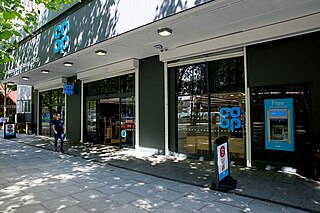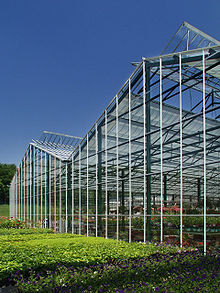
A convenience store, bodega, convenience shop, corner store or corner shop is a small retail store that stocks a range of everyday items such as tea, coffee, groceries, fruits, vegetables, snacks, confectionery, soft drinks, ice creams, tobacco products, lottery tickets, over-the-counter drugs, toiletries, newspapers and magazines.

A supermarket is a self-service shop offering a wide variety of food, beverages and household products, organized into sections. This kind of store is larger and has a wider selection than earlier grocery stores, but is smaller and more limited in the range of merchandise than a hypermarket or big-box market. In everyday United States usage, however, "grocery store" is often used to mean "supermarket".

A grocery store (AE), grocery shop (BE) or simply grocery is a foodservice retail store that primarily retails a general range of food products, which may be fresh or packaged. In everyday U.S. usage, however, "grocery store" is a synonym for supermarket, and is not used to refer to other types of stores that sell groceries. In the UK, shops that sell food are distinguished as grocers or grocery shops (though in everyday use, people usually use either the term "supermarket" or a "corner shop".

Hardware stores, sometimes known as DIY stores, sell household hardware for home improvement including: fasteners, building materials, hand tools, power tools, keys, locks, hinges, chains, plumbing supplies, electrical supplies, cleaning products, housewares, tools, utensils, paint, and lawn and garden products directly to consumers for use at home or for business. Many hardware stores have specialty departments unique to its region or its owner's interests. These departments include hunting and fishing supplies, plants and nursery products, marine and boating supplies, pet food and supplies, farm and ranch supplies including animal feed, swimming pool chemicals, homebrewing supplies and canning supplies. The five largest hardware retailers in the world are The Home Depot, Lowe's, Kingfisher of the United Kingdom, Obi of Germany, and Leroy Merlin of France.

ICA Gruppen AB is a Swedish retailer franchise with a focus on food and health. The group also owns a bank, real estate division and a pharmacy chain.
Agribusiness is the industry, enterprises, and the field of study of value chains in agriculture and in the bio-economy, in which case it is also called bio-business or bio-enterprise. The primary goal of agribusiness is to maximize profit while satisfying the needs of consumers for products related to natural resources such as biotechnology, farms, food, forestry, fisheries, fuel, and fiber.
Bunnings Group Limited, trading as Bunnings Warehouse or Bunnings, is an Australian household hardware and garden centre chain. The chain has been owned by Wesfarmers since 1994, and has stores in Australia and New Zealand.

Kmart Australia Limited is an Australian chain of retail department stores owned by the Kmart Group division of Wesfarmers.
Frank's Nursery & Crafts was an American retailer devoted to the sale of lawn and garden products. It operated a chain of stores, with 170 outlets across 14 states. It specialized in products such as shrubs, trees, accent plants, flowers, and lawn furniture, as well as various arts and crafts items.

A retail park is a type of shopping centre found on the fringes of most large towns and cities in the United Kingdom and other European countries. They form a key aspect of European retail geographies, alongside indoor shopping centres, standalone stores like hypermarkets and more traditional high streets.

Wyevale Garden Centres was a British chain of garden centres.

The floral industry is focused on the production, distribution and sale of flowers for human enjoyment. The floral industry began in the Golden Century of the Netherlands, where flowers were grown on a large scale on vast estates. The industry continues to diversify from the production of cut flowers to the production and sale of plants and flowers in many different forms. The global floral industry market size is estimated to be worth US$ 50040 million in 2022 and is forecast to increase to US$ 58030 million by 2028 with a compound annual growth rate of 2.5% during the review period.

Notcutts Garden Centres Ltd. is a private limited company. The family-owned group operates 19 individual garden centres across England. Notcutts also owns one of the UK's largest rose specialists (Mattocks).

RHS Garden Rosemoor is a public display garden run by the Royal Horticultural Society in north Devon, England.

Bauhaus AG is a German pan-European retail chain offering products for home improvement, gardening, and workshop. The name contains the German words bauen and Haus (house), but also alludes to the modernist Bauhaus school and the company's founder and owner, the German billionaire Heinz-Georg Baus.
Dobbies Garden Centres Limited is a British chain of garden centres based in Lasswade, Scotland. It is the biggest garden centre operator in the United Kingdom, operating over 77 stores, some of which it acquired from the previous biggest garden centre chain, Wyevale.
Alan Herbert Vauser Bloom was a British horticulturist and steam engine enthusiast. During his life he created over 170 new varieties of hardy perennial plants. These and Alpine plants and conifers were his specialities. He invented the garden feature of freestanding island beds, set in open lawn. He wrote some 30 books and appeared on radio and television.

Co-op Food is a brand used for the food retail business of The Co-operative Group in the United Kingdom.
QD Commercial Group Holdings Limited, trading as QD Stores is an independently owned discount retailer operating in the United Kingdom, primarily in East Anglia and the East Midlands regions. Products stocked include a mixture of items for the home and garden, basic groceries and a range of clothing and footwear. The company also run Cherry Lane Garden Centres.
The retail format influences the consumer's store choice and addresses the consumer's expectations. At its most basic level, a retail format is a simple marketplace, that is; a location where goods and services are exchanged. In some parts of the world, the retail sector is still dominated by small family-run stores, but large retail chains are increasingly dominating the sector, because they can exert considerable buying power and pass on the savings in the form of lower prices. Many of these large retail chains also produce their own private labels which compete alongside manufacturer brands. Considerable consolidation of retail stores has changed the retail landscape, transferring power away from wholesalers and into the hands of the large retail chains.















